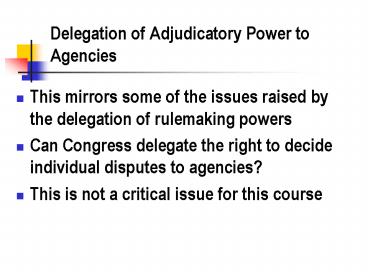Delegation of Adjudicatory Power to Agencies - PowerPoint PPT Presentation
Title:
Delegation of Adjudicatory Power to Agencies
Description:
Delegation of Adjudicatory Power to Agencies This mirrors some of the issues raised by the delegation of rulemaking powers Can Congress delegate the right to decide ... – PowerPoint PPT presentation
Number of Views:93
Avg rating:3.0/5.0
Title: Delegation of Adjudicatory Power to Agencies
1
Delegation of Adjudicatory Power to Agencies
- This mirrors some of the issues raised by the
delegation of rulemaking powers - Can Congress delegate the right to decide
individual disputes to agencies? - This is not a critical issue for this course
2
Article III Judges
- Protections
- Lifetime tenure
- Cannot reduce salary
- Cannot fire, only impeach
- Cannot discipline
- Why do we have these protections?
3
How are ALJs different?
- Civil service protections
- Can be fired
- Can have salary lowered, but hard to do this
- Can set work standards and discipline
- How are the pressures different than those on an
Article III judge?
4
Adjudication of Public Rights
- Public rights have an evolving definition
- One definition is that these are rights created
by congress, such as the right to government land
or welfare benefits - One set of cases indicates that since Congress
creates these rights, they can set how they are
awarded - Congress can set up compensation that is not
related to real facts - Remember this later when we see the "bitter with
the sweet" doctrine
5
Can an Agency Adjudicate Private Claims?
- The United States Supreme Court invalidated a law
letting bankruptcy judges decide contract issues
in 1982 because it was not reviewable by an Art.
III judge - This was a narrow plurality decision driven by
the broad powers of bankruptcy courts - It has been implicitly limited by later cases
6
Commodity Futures Trading Commission v. Schor
- CFTC can adjudicate disputes between clients and
brokers, and award damages - Can also adjudicate counterclaims because
otherwise everything would go do court
7
Does Adjudication of Private Claims Violate
Separation of Powers?
- A key question becomes the appeal rights to the
courts - Orders must be enforced by the courts, so they
can be reviewed - Decisions are subject to judicial review
- We will see this in the judicial review section
as a debate over the proper record for review
8
Right to Jury Trial
- There is a right to a jury trial for certain
federal civil matters that were part of the
common law when the Constitution was adopted - The courts have construed these rights narrowly,
limiting them to their historical antecedents,
such as maritime cases - Many states do not allow adjudication of private
disputes under state constitutional open courts
provisions - LA had to have a constitutional amendment to
allow worker's compensation
9
Limitations on Adjudication
- An agency cannot imprison someone as a punishment
- Under federal and some state laws, a person can
be imprisoned for violating an agency regulation - Must get a criminal trial
- Regulation must pass the vagueness test
10
State v. Broom, 439 So.2d 357 (La. 1983)
- Defendant was prosecuted for violating the
Louisiana Explosives Code - Challenged on void for vagueness and on
non-delegation theories - On first review, the LA SC rejected the
challenges and found that he could be prosecuted
for violating an agency regulations - On rehearing, the Court found that prosecuting on
an agency rule violated separation of powers































